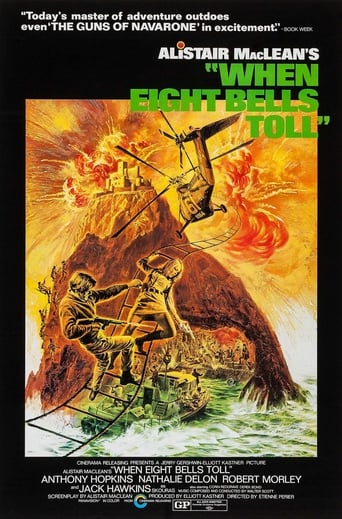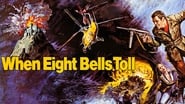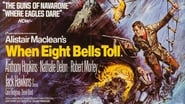zardoz-13
Alistair Maclean wrote dozens of international bestsellers, and "When Eight Bells Toll" was one of several screenplays that the Scottish novelist penned. Oscar-winning actor Anthony Hopkins was slim and trim back in 1971 when producer Elliott Kastner cast him as Royal Navy scuba diving expert Commander Philip Calvert for this ocean-going opus about five hijacked British bullion ships in the Irish Sea. At one point, the grim but indestructible Calvert informs his peremptory superior that he doesn't have guests and friends, just enemies. Of course, that's an overstatement. He does have friends, but they seem to die at the hands of his enemies. Indeed, those enemies keep Calvert jumping through metaphorical flaming hoops in this straightforward saga. Calvert isn't a man to quibble when it comes to enemies, particularly if they have killed some of his friends. He rams two armed thugs in a boat with his yacht, knocking them overboard so they lose their assault rifles and then swim desperately to shore. Does this keep Calvert from shooting them as they swim away from him in the back? No, it doesn't, and you know that you're watching a gritty, above-average thriller when he guns those guys down without a qualm. Interestingly enough, "When Eight Bells Toll" was Hopkins' first role as the leading man. He knocks the bottom out of the role, and it would have been a recurring character for him to play, except this S 7-million Maclean thriller floundereed at the box office. Nevertheless, "The Day the Hot Line Got Hot" helmer Etienne Périer, who also directed "Zeppelin," maintains momentum throughout all the action and intrigue and never deviates from his destination. Maclean and he see to it that nothing Calvert does is without peril. Meaning, this don't give our hero a break. During one sequence, Calvert goes aloft courtesy of the Royal Navy to fly around the area in search of places where the villains might hide the bullion ships. Naturally, the trigger-happy villains complicate his life by shooting down the helicopter. The helicopter pilot, Lieutenant Williams (Maurice Roëves of "The Eagle Has Landed") takes enough bullets through the chest to die at the control stick, and the helicopter not only crashes but also sinks to the bottom of the bay near the coast. Calvert conceals himself with the help of a respirator just beneath the villains as they survey the waters for him. When they weren't shooting this item at Pinewood in England, the filmmakers were doing exteriors in Scotland in Fingal's Cave, Staffa, Argyll, and Bute. "Where Eagles Dare" lenser Arthur Ibbetson's widescreen cinematography captures all the grit and the beauty of the rugged Scots locations. As Sir Arthur Artford Jones ('Uncle Arthur'), Robert Morley is good as Calvert's supercilious superior. Uncle Arthur and Calvert don't immediately get off on the right foot, and Arthur considers Calvert both insolent and insubordinate. These two wind up working together to thwart the villains. "When Eight Bells Toll" contains all the ingredients of a sturdy Maclean thriller: mystery, surprises, a hero competent on land, sea, and beneath water, and a sterling cast that includes Jack Hawkins and Ferdy Mayne. This movie is worth watching!
gbenskin
It seems that the whole world and their dogs know of Commander Bond, who takes his martinis shaken and not stirred, has his dalliances with the ladies, and manages to save the world before dawn.Agent Calvert (played most suitably by Anthony Hopkins) is how I believe Bond should have been. Both are Commanders of the British Navy I believe, both educated 'working class' and with both, you get a sense of being slight sociopaths. Don't get me wrong, I really am a fan of the Bond genre, but this performance by Hopkins seems gritty and more realistic a character and compares quite favourably to the Bond character played by other actors.There is some great dialogue between the upper middle class boss of Agent Calvert (Uncle Arthur played by Robert Morley) and Agent Calvert, which helps keep interest in the film between the action scenes. Compared to many of the scenes produced by action heroes of the last 10 years, some are a little dated, although there were still enough to keep me interested.Nathalie Delon was a great choice as the leading lady requiring rescue from the sea (were her intentions good or bad?), and its a pity that most outside of her native country did not see much more of her in other things.One of my personal favourite pieces of work by Anthony Hopkins.If you're an action fan, I still think this is worth a look. Long overdue a worthy remake I think.
NOORKOIVA
It's important that films such as this be recognised as breaking away from the 60's bond fayre, and that they introduced a gritty reality all of their own. Bond indeed could never say 'bastard'. Even though he really was. Bond films strayed from the books,which as period literature remains quite good. Where as EBT was reasonably similar to what the author wanted to get across. A man in a dangerous situation, dealing with ruthless adversaries,who kills without hesitation. Very military, very straight to the point. Bound to upset the Vicars wife at the local tea party. But he wouldn't care, he would sooner be elsewhere, Pursuing the enemy, where ever they hide in the class system, tap, tap, he's slotted, move on. A perpetually restless individual, as Mr Hopkins no doubt was at that point in his life. Drowning his frustrations in alcohol when off duty (as does every professional?) I am off to Scotland this month, to the Kyle of Lochalsh. To me as a teenager this was a significant film in my development, as well as the book. In a politically correct world, where cynical reality can only be found in 'spin', a world in which the late author could only bemoan; I find solace in this film. Where people actually disprove of my children playing with their toy guns and reading Commando magazine; in the comfortable cities which refuse to recognise the reality of living and surviving in the Hebridies; Please take me back to 1971!. These old values are as strong as ever and this films principles and values remain the same to this day.Alan David Noorkoiv.
L. Denis Brown
During the period since long distance travel became much more widespread in the 1950's, paperback thriller novels have become an increasingly important part of newly published friction. Before any long journey, we go into the bookstall in the airport, railway station or bus station from which we are departing and choose a paperback to keep us occupied during our journey. In many cases the choice is a thriller which is discarded on our return home. But before this how often have we seen a page at the end saying something like "Now to become a major motion picture starring.........." The coupling of paperback and movie versions of new thrillers has become increasingly important during recent decades. Over the years old writers have retired and new writers have built big reputations, but the process is ongoing. As soon as a successful new thriller appears in the bookstalls, movie studios compete to buy up the film rights. Not all the books for which film rights have been purchased actually finish up as movies but many of them do; so we now have movies, readily available for home viewing, which are based on novels from such highly respected writers of thrillers as Hammond Innes, Alistair MacLean, Tom Clancy and many others. In total these constitute a significant portion of the new movies that are now released each year. Alistair MacLean is credited by IMDb with 17 novels which have been filmed for either the cinema or television. It is reported that he was unhappy with the screenplay written for the earlier movies made from his novels and insisted on participating in writing the screenplay for all the later ones. "When Eight Bells Toll" was one of the movies for which he receives credits as both the author of the book and the writer of the screenplay. It is very interesting to find that several IMDb users have still been sharply critical of this film on the basis that much of it is too slow and spends too long in character development, leaving the action sequences too short and too far apart for the viewers interest to be fully maintained. In general I am not an enthusiast for movies made from thriller novels, which are usually a hybrid of who-dun-it and action sequences - the latter generally seem to involve gun battles or more basic hand to hand combats that are usually unpleasantly noisy, digitally enhanced to the point where they appear highly improbable, and far too lengthy in duration. I find that the prominence given to the shoot-out action sequences in such movies usually means that there is no time for gradually revealing the complexities of character that made the original novel interesting. In contrast to most of the other IMDb users who have commented on this film, this would be my chief criticism of "When Eight Bells Toll"; so my comments, or rating, would appear to be of little value to readers who have a different appreciation for this type of film. For me the most enjoyable parts of this film were the splendid photography of the Scottish west coast scenery, and some evocative sequences involving small craft handling which brought back many memories. Somehow the story never clicked although this film has a great cast and some very taut dialogue. I particularly enjoyed the interplay of character between Anthony Hopkins playing a very dour investigator, Corin Redgrave playing his sidekick, and Robert Morley who gives a great performance as their superior officer. Aided by its sharp, realistic and down to earth dialogue, most of the film was quite readily believable but unfortunately I did not find the final shootout in a concealed rocky inlet very convincing. As a film I would rate it somewhere in the middle of the scale, as a reasonably competent pot-boiler but no more. I am a great fan of Alastair MacLean's novels, but will not be rushing out to buy a videotape or DVD of any of the others that I have read, even if he was responsible for the screenplay himself.






